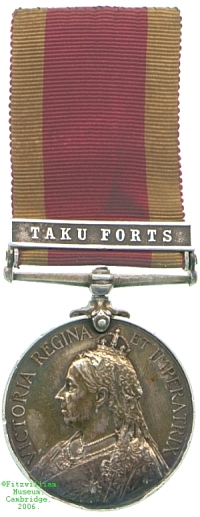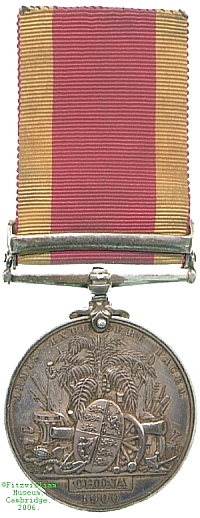
Obverse, a bust of Queen Victoria

Reverse, a collection of war trophies including a royal shield below palm tree

Obverse, a bust of Queen Victoria |

Reverse, a collection of war trophies including a royal shield below palm tree |
The extent to which foreign powers appeared to be able to intervene in nineteenth-century China without effective opposition from the Imperial dynasty led to considerable resentment among the population. In 1897 Germany, Russia, Britain and France seized four Chinese ports on various pretexts and this, with more local situations providing flashpoints, sparked off a military uprising by a resistance group called the Society of Righteous and Harmonious Fists, known in the West as Boxers. Starting in 1898 foreigners and Christian Chinese were subjected to increasingly brutal persecution by the Boxers, whom the Imperial Government, in the hands of the Dowager Empress Cixi, were now supporting as useful tools to remove foreign powers from China. It took the Western powers some time to assemble a coalition force strong enough (mostly Japanese, but with contingents from Russia, Britain, France, the USA, Germany, Italy and Austro-Hungary as well as some Chinese) to relieve the foreign population of Beijing and finally suppress the rebellion.
The recipient of this medal, Stoker H. Devlin, served aboard HMS Fame, which due to the eagerness of its captain, Roger Keyes (at death Admiral of the Fleet and 1st Baron Keyes), to get into every possible fight, was one of two British destroyers which captured four brand-new Chinese ones of considerably more than twice their firepower without loss at the Taku Forts. Unlike his captain, however, who was on leave running supplies to Tientsin in a tugboat, Stoker Devlin earned the bar for the rapidly subsequent capture of the forts. His medal was purchased by Lester Watson at some point before 1928.